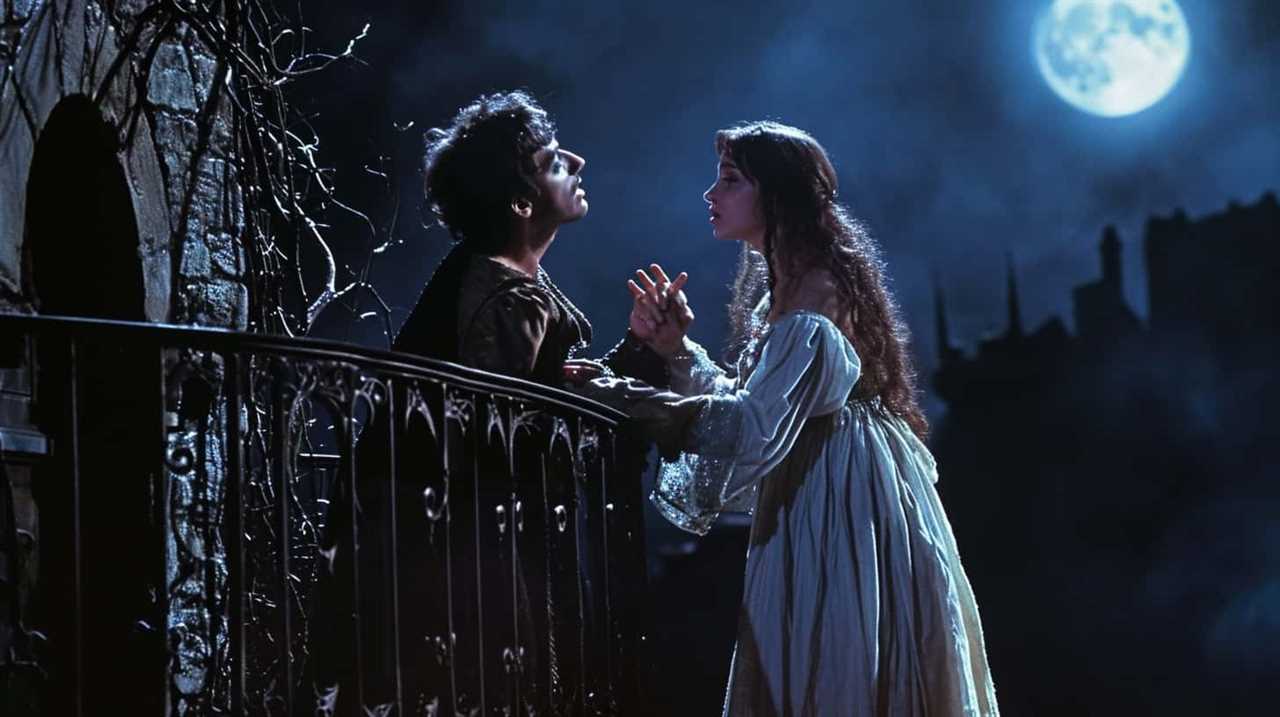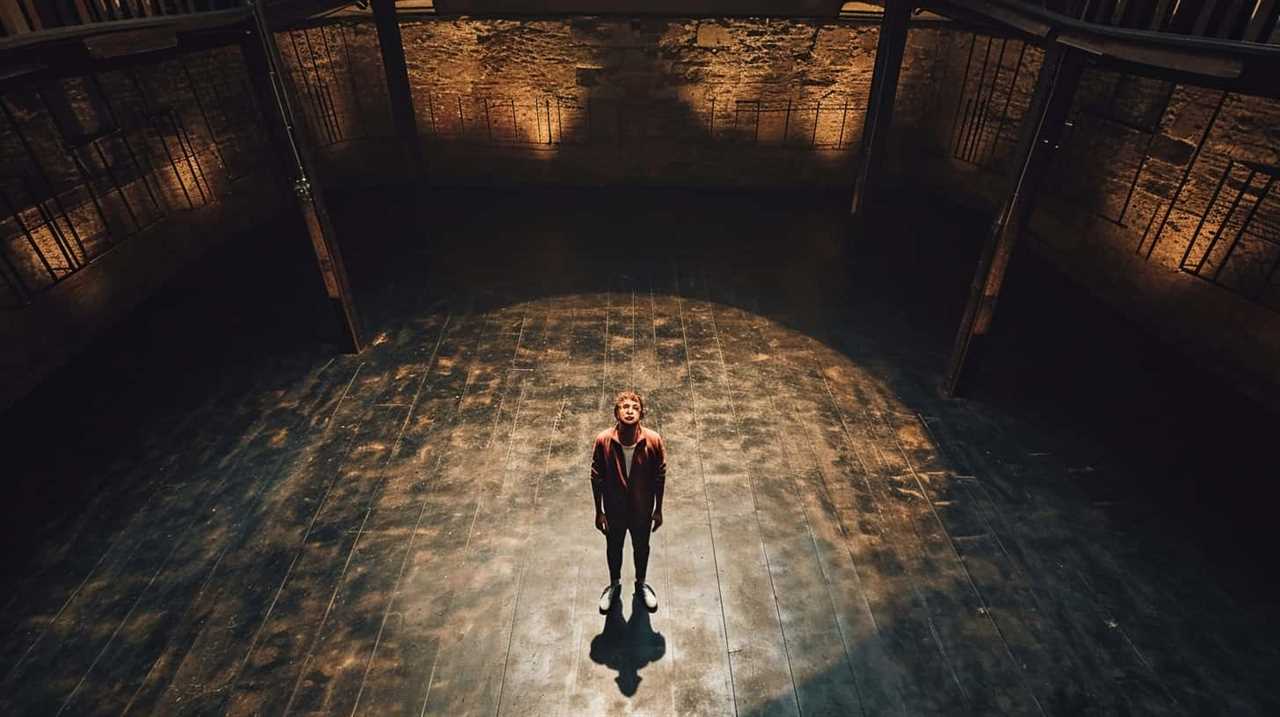Want to delve into existential thought? Look no further! Check out these eight profound quotes from beloved fiction works that will lead you into a world of contemplation.
From Albert Camus’ ‘The Stranger’ to Harper Lee’s ‘To Kill a Mockingbird,’ these timeless classics have left an indelible mark on literature and philosophy alike.
Brace yourself for a journey into the unknown as you explore the existential themes woven into the fabric of these captivating stories. Get ready to question the meaning of life, wrestle with the absurdity of existence, and contemplate the nature of free will.
Get ready to embark on a quest for truth and enlightenment through the power of fiction.

Key Takeaways
- Existential themes are explored in fiction works such as ‘The Stranger’, ‘The Metamorphosis’, and ‘Slaughterhouse-Five’.
- Modern society is characterized by alienation and isolation, with individuals lacking meaningful relationships and feeling misunderstood.
- ‘The Metamorphosis’ uses symbolism to depict the loss of identity and dehumanization.
- ‘Slaughterhouse-Five’ explores the devastating impact of war on the human spirit and raises questions about free will and the meaning of life.
The Stranger" by Albert Camus
In ‘The Stranger’ by Albert Camus, you experience the unsettling story of a man named Meursault as he navigates the absurdity of existence. The novel explores themes of alienation and existentialism, offering a thought-provoking reflection on the human condition.
Meursault, the protagonist, is portrayed as an outsider, detached from the norms and expectations of society. His indifference towards social conventions and his inability to express emotions create a sense of alienation from the world around him. Through Meursault’s perspective, Camus challenges the reader to question the meaning and purpose of life, highlighting the absurdity and existential angst that can arise from our existence.
Existentialism, a philosophy that emphasizes individual existence, choice, and freedom, is central to ‘The Stranger’. Meursault’s actions and reactions throughout the novel embody the existentialist belief that individuals are solely responsible for creating meaning in their own lives. The novel forces us to confront the uncomfortable truth that life may ultimately be devoid of inherent meaning, leaving us to grapple with our own existential dilemmas.
The Metamorphosis" by Franz Kafka
As you delve into Kafka’s ‘The Metamorphosis,’ you’re confronted with profound existential themes that resonate on a deep level. Through Gregor’s transformation into a giant insect, Kafka symbolizes the human condition and the inherent struggle for identity and meaning in a world that often rejects and alienates individuals.

This alienation is further emphasized through the portrayal of society’s response to Gregor’s transformation, highlighting the absurdity and isolation that can be experienced by those who don’t conform to societal norms.
Kafka’s Existential Themes
Explore Kafka’s existential themes in ‘The Metamorphosis’ by delving into the protagonist’s psychological transformation. Kafka’s existentialism, heavily influenced by his own personal struggles and the turbulent times in which he lived, has left an indelible mark on modern literature. In ‘The Metamorphosis,’ the main character, Gregor Samsa, wakes up one morning to find himself transformed into a gigantic insect. This physical metamorphosis serves as a metaphor for Gregor’s existential crisis, highlighting themes of alienation, isolation, and the absurdity of human existence. Through Gregor’s experiences, Kafka presents a bleak and haunting portrayal of the human condition, forcing readers to confront their own feelings of meaninglessness and despair. Kafka’s unique blend of introspection and surrealism continues to captivate audiences, making his work a timeless exploration of the existential depths of the human psyche.
| Existential Themes in ‘The Metamorphosis’ | ||
|---|---|---|
| Alienation | Isolation | Absurdity |
| Gregor’s transformation into an insect symbolizes his profound sense of alienation from society. | Gregor’s physical transformation leads to his complete isolation from the outside world, highlighting the theme of loneliness. | The absurdity of Gregor’s situation, the absurdity of life itself, is depicted through the bizarre and surreal events that unfold in the story. |
Gregor’s Transformation Symbolism
Discover the profound symbolism behind Gregor’s transformation into an insect in Kafka’s ‘The Metamorphosis’ through the use of a compound preposition.
Kafka’s portrayal of Gregor’s transformation serves as a powerful symbol for the existential themes explored in the novella. By transforming Gregor into an insect, Kafka explores the alienation and isolation experienced by individuals in modern society.

Gregor’s physical change represents his inner transformation, highlighting his loss of identity and his struggle to find meaning in his new existence. The insect symbolizes Gregor’s dehumanization, as he becomes a mere insect in the eyes of his family and society.
Through this symbolism, Kafka prompts the reader to question the nature of identity, the meaning of life, and the absurdity of human existence. Gregor’s transformation serves as a metaphor for the human condition and the existential crisis faced by individuals in a complex, indifferent world.
The Alienation of Society
In the novella ‘The Metamorphosis’ by Franz Kafka, you can witness the profound alienation of society through Gregor’s transformation into an insect. This transformation serves as a powerful metaphor for the isolation and detachment that many individuals experience in modern society. In today’s digital age, where we are constantly connected yet paradoxically disconnected, alienation has become a prevalent issue. People may find themselves surrounded by others, yet still feel isolated and alone. They may spend hours scrolling through social media, but still feel disconnected from genuine human connection. The table below highlights some key differences between alienation in modern society and isolation in a digital age:
| Alienation in Modern Society | Isolation in a Digital Age |
|---|---|
| Lack of meaningful relationships | Superficial connections |
| Feeling misunderstood and outcasted | Fear of missing out (FOMO) |
| Struggling to find a sense of belonging | Constant comparison and self-doubt |
| Disconnect between individual and society | Loss of genuine human interaction |
| Overwhelming sense of loneliness | Addiction to virtual world |
As we delve into another beloved fiction work, ‘Slaughterhouse-Five’ by Kurt Vonnegut, we will explore the theme of time and its effect on human existence.

Slaughterhouse-Five" by Kurt Vonnegut
As you explore ‘Slaughterhouse-Five’ by Kurt Vonnegut, you’ll encounter the concept of time as the fourth dimension. Vonnegut’s use of nonlinear storytelling challenges traditional notions of cause and effect, highlighting the idea that time isn’t linear but rather a jumbled and unpredictable construct.
Additionally, the impact of war is a recurring theme in the novel, forcing readers to confront the existential questions surrounding the purpose and consequences of human conflict.
Time as Fourth Dimension
You often find yourself contemplating the concept of time as a fourth dimension in Kurt Vonnegut’s ‘Slaughterhouse-Five’.
In this novel, Vonnegut takes readers on an existential exploration, challenging traditional notions of time and its linear progression. Through the protagonist Billy Pilgrim’s experiences of time travel, Vonnegut introduces the idea that time isn’t just a unidirectional force but a dimension that can be traversed.

This concept of time as a fourth dimension opens up possibilities for new perspectives and understandings of the universe. Vonnegut’s portrayal of time in ‘Slaughterhouse-Five’ forces us to question our own perception of time and encourages us to consider the interconnectedness of past, present, and future.
As we delve further into the novel, we’ll see how this unique perspective on time intertwines with the impact of war.
Impact of War
When examining the impact of war in ‘Slaughterhouse-Five’ by Kurt Vonnegut, one can’t help but feel the profound devastation it inflicts on the human spirit. Vonnegut’s protagonist, Billy Pilgrim, experiences the horrors of World War II and becomes unstuck in time, a reflection of the disorientation and fragmentation of the human psyche in the face of trauma. The psychological effects of war are explored through Vonnegut’s use of dark humor and absurdity, highlighting the absurdity of war itself.
Through Billy’s experiences, Vonnegut raises questions about the nature of free will, destiny, and the meaning of life in the face of such immense suffering. The impact of trauma is evident in the way Billy struggles to reconcile his memories and experiences, resulting in a fractured sense of self.

Transitioning into George Orwell’s ‘1984’, we see how the impact of war is further explored in a dystopian society where psychological manipulation and control are used to maintain power.
1984" by George Orwell
In George Orwell’s ‘4’, the protagonist navigates a dystopian world controlled by a totalitarian regime. This novel, often overshadowed by Orwell’s more famous works such as ‘1984’ and ‘Animal Farm’, offers a profound exploration of existentialism and serves as a scathing critique of totalitarianism.
Orwell’s incorporation of existential themes in ‘4’ allows readers to ponder the individual’s search for meaning and purpose in a world stripped of autonomy and freedom. The protagonist’s struggle to maintain his identity and agency within the oppressive regime echoes the existentialist belief that individuals must create their own purpose in life, even in the face of overwhelming control.
Through a 2 column and 3 row table, Orwell conveys a deeper meaning to the audience. The table juxtaposes the regime’s propaganda slogans with the protagonist’s internal thoughts and emotions, highlighting the stark contrast between the regime’s false sense of certainty and the protagonist’s existential questioning. This visual representation prompts readers to reflect on the dangers of blindly accepting authority and the importance of maintaining critical thinking in the face of totalitarianism.

In ‘4’, Orwell masterfully combines existentialist themes with his critique of totalitarianism, provoking readers to question the nature of power, individuality, and the pursuit of truth. This thought-provoking novel serves as a powerful reminder of the importance of preserving our autonomy and resisting oppressive systems that seek to strip away our humanity.
Brave New World" by Aldous Huxley
Aldous Huxley’s ‘Brave New World’ presents a dystopian society where individuals are controlled and conditioned from birth. In this brave new world, the loss of individuality is a direct result of the society’s extreme reliance on technological advancements.
The citizens of this dystopian society are conditioned to fit into predetermined social roles, erasing any sense of individuality. Technological advancements, such as the use of genetic engineering and mind-altering drugs, are used to manipulate and control the population.
The pursuit of happiness is prioritized over personal freedom and critical thinking, leading to a society devoid of authentic emotions and experiences. The novel explores the dangers of a society that values conformity and uniformity at the expense of individual identity and personal growth.

As Huxley’s ‘Brave New World’ delves into the consequences of a world where individuality is suppressed in the pursuit of stability and control, it sets the stage for a deeper exploration of the human condition in Ray Bradbury’s ‘Fahrenheit 451’.
Fahrenheit 451" by Ray Bradbury
As you delve into Ray Bradbury’s ‘Fahrenheit 451’, the exploration of a dystopian world devoid of individuality in Huxley’s ‘Brave New World’ sets the stage for a deeper understanding of the human condition. In ‘Fahrenheit 451’, Bradbury presents a society in which books are banned, knowledge is suppressed, and critical thinking is discouraged. This oppressive regime leads to a profound sense of alienation among its citizens.
In this world, censorship isn’t only enforced by the government but also willingly embraced by the people. The burning of books symbolizes the destruction of ideas and the suppression of individualism. By eradicating literature, the government seeks to maintain control and prevent dissent. However, this censorship ultimately leads to a society devoid of meaningful connections and genuine human interaction.
The theme of alienation in ‘Fahrenheit 451’ highlights the devastating consequences of a society that values conformity over individuality. The protagonist, Guy Montag, initially conforms to the oppressive regime but eventually questions the status quo. As he begins to question and rebel against censorship, he becomes increasingly alienated from his fellow citizens who are content with their shallow existence.

Bradbury’s ‘Fahrenheit 451’ serves as a cautionary tale, reminding us of the importance of free thought and expression. It challenges us to question the consequences of a society that suppresses individuality and the essential role that literature plays in shaping our humanity. Through the exploration of alienation and censorship, Bradbury prompts us to reflect on the dangers of a world devoid of critical thinking and the power of ideas.
The Catcher in the Rye" by J.D. Salinger
Immerse yourself in J.D. Salinger’s ‘The Catcher in the Rye’, and witness a young protagonist’s existential journey of disillusionment and rebellion. In this timeless classic, Salinger delves into the depths of human existence, exploring themes of the loss of innocence and the overwhelming sense of isolation that plagues the protagonist, Holden Caulfield.
- Alienation and Isolation: Holden’s constant search for authentic connections in a world he perceives as superficial and phony reflects the universal struggle of finding one’s place in society.
- The Loss of Innocence: Salinger masterfully portrays the loss of innocence through Holden’s longing to preserve the innocence of childhood, as he attempts to protect his younger sister, Phoebe, from the harsh realities of adulthood.
- Identity and Authenticity: Holden’s aversion to conformity and his desire to remain true to himself invite readers to question their own identities and the masks they wear to fit into society.
- Existential Angst: The novel’s exploration of existential themes, such as the search for meaning and the fear of mortality, forces readers to confront their own existential dilemmas.
Through Salinger’s compelling storytelling, ‘The Catcher in the Rye’ provides a thought-provoking examination of the human condition, leaving readers contemplating their own experiences of isolation and the inevitable loss of innocence that accompanies the journey into adulthood.
To Kill a Mockingbird" by Harper Lee
In ‘To Kill a Mockingbird’ by Harper Lee, you’ll witness the profound exploration of social injustice and racial prejudice in a small Southern town. Lee masterfully uses symbolism throughout the novel to highlight the deep-rooted racism and social inequality that plague the community.

One of the most prominent symbols in the novel is the mockingbird, which represents innocence and purity. Atticus Finch, the moral compass of the story, teaches his children, Scout and Jem, that it’s a sin to kill a mockingbird because they only bring beauty and joy to the world. This symbolizes the unjust persecution of innocent individuals, such as Tom Robinson, a black man falsely accused of rape.
Lee also employs the symbol of the tree to depict the division and inequality within the town. The tree, which is initially a place of refuge and friendship for the children, becomes a site of racial tension when Scout and Jem witness the lynching of Mr. Robinson. This event exposes the harsh reality of racial injustice and the deep-seated prejudices that exist within the community.
Through these symbols, Lee challenges her readers to confront the harsh realities of racism and social inequality. She forces us to question our own complicity in these injustices and inspires us to strive for a more just and equal society.
‘To Kill a Mockingbird’ serves as a powerful reminder that the fight against racism and social inequality is ongoing and requires our unwavering commitment.

Frequently Asked Questions
What Is the Plot of "The Stranger" by Albert Camus?
In ‘The Stranger’ by Albert Camus, you delve into the existentialism and absurdity of life through the story of Meursault, a man who confronts the meaningless and unpredictable nature of existence.
How Does Gregor Samsa Transform in "The Metamorphosis" by Franz Kafka?
In ‘The Metamorphosis’ by Franz Kafka, Gregor Samsa undergoes a profound psychological transformation. This metamorphosis not only affects him but also has a profound impact on his family, challenging their perceptions and forcing them to confront their own existential dilemmas.
What Is the Main Theme in "Slaughterhouse-Five" by Kurt Vonnegut?
The main theme in ‘Slaughterhouse-Five’ is the exploration of existentialism through the lens of time travel. The novel delves into the futility of human existence and the disorienting nature of time, challenging conventional notions of reality and purpose.
How Does the Dystopian Society in "1984" by George Orwell Control Its Citizens?
In ‘1984’ by George Orwell, the dystopian society exercises control over its citizens through methods like constant surveillance, propaganda, and manipulation of information. These tactics effectively strip individuals of their freedom and autonomy.

What Is the Role of Technology in "Brave New World" by Aldous Huxley?
In ‘Brave New World’ by Aldous Huxley, technology plays a significant role in enabling the dystopian society’s control over its citizens. The consequences of this societal control are explored through the dehumanization and manipulation of individuals.
Conclusion
As you delve into the existential quotes from these beloved fiction works, you’ll find yourself navigating through the labyrinth of human existence. Like a compass guiding lost souls, these quotes serve as a mirror reflecting our deepest fears, desires, and questions about life.
They invite us to ponder the essence of our existence, urging us to confront the absurdity, the metamorphosis, and the inevitable truths that lie within.
These quotes are like keys unlocking the doors to our own existential journey, compelling us to confront our own realities.

Lauren’s talent in writing is matched by her passion for storytelling. Her love for books and deep understanding of culture and entertainment add a distinct flavor to her work. As our media and press contact, Lauren skillfully bridges the gap between afterQuotes and the broader media landscape, bringing our message to a wider audience.










